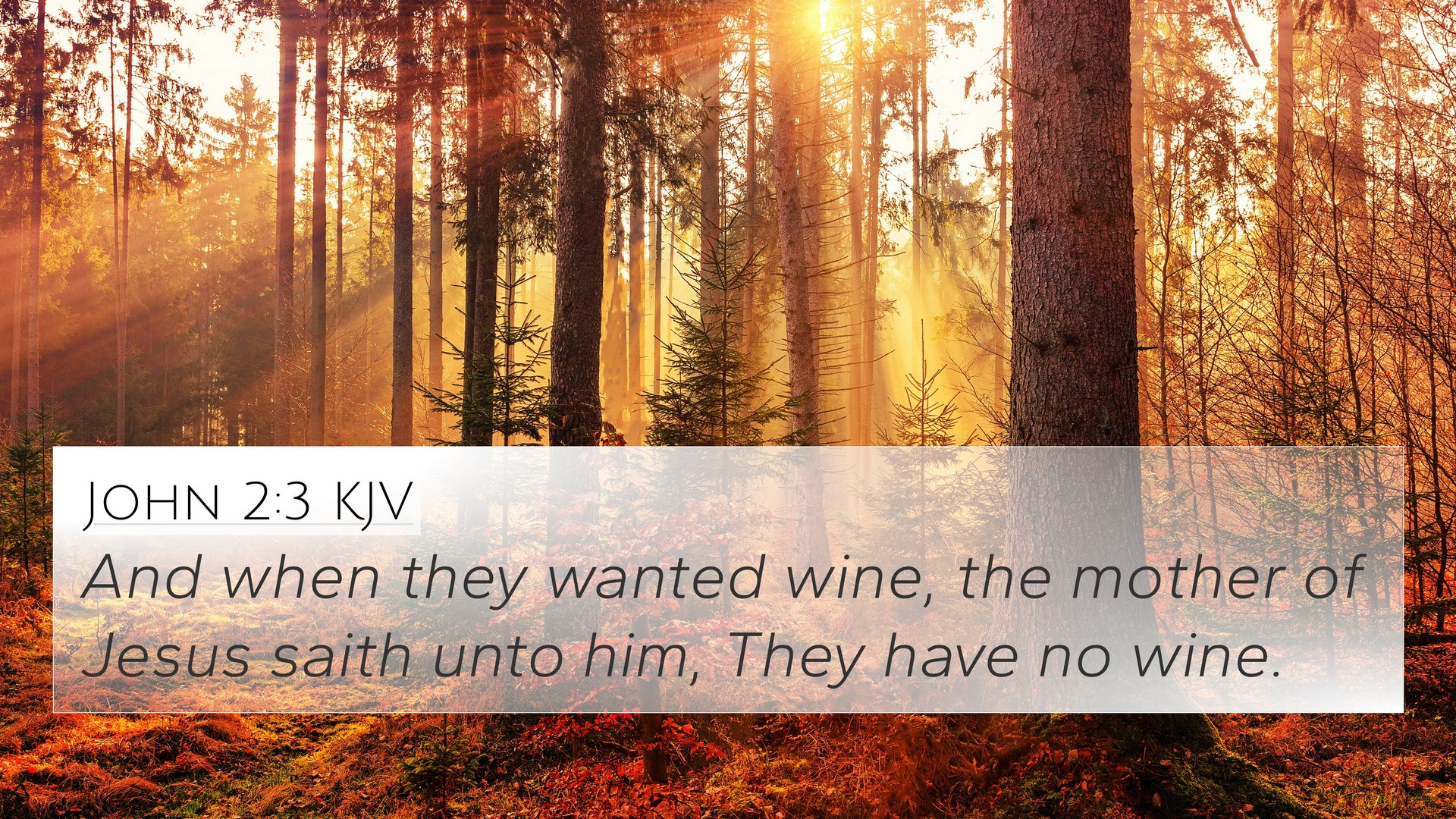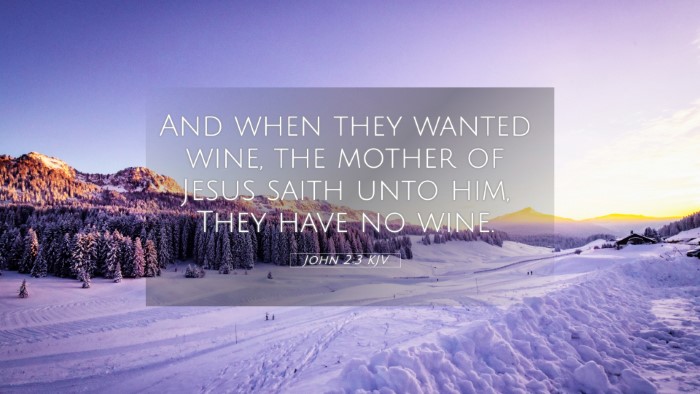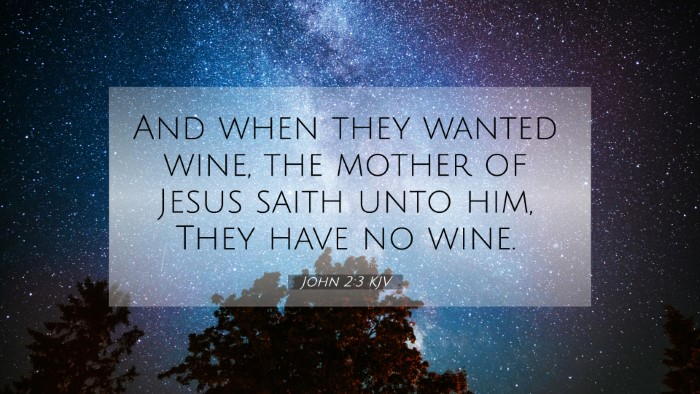Old Testament
Genesis Exodus Leviticus Numbers Deuteronomy Joshua Judges Ruth 1 Samuel 2 Samuel 1 Kings 2 Kings 1 Chronicles 2 Chronicles Ezra Nehemiah Esther Job Psalms Proverbs Ecclesiastes Song of Solomon Isaiah Jeremiah Lamentations Ezekiel Daniel Hosea Joel Amos Obadiah Jonah Micah Nahum Habakkuk Zephaniah Haggai Zechariah MalachiJohn 2:3 Similar Verses
John 2:3 Cross References
And when they wanted wine, the mother of Jesus saith unto him, They have no wine.
Uncover the Rich Themes and Topics of This Bible Verse
Listed below are the Bible themes associated with John 2:3. We invite you to explore each theme to gain deeper insights into the Scriptures.
John 2:3 Cross Reference Verses
This section features a detailed cross-reference designed to enrich your understanding of the Scriptures. Below, you will find carefully selected verses that echo the themes and teachings related to John 2:3 KJV. Click on any image to explore detailed analyses of related Bible verses and uncover deeper theological insights.
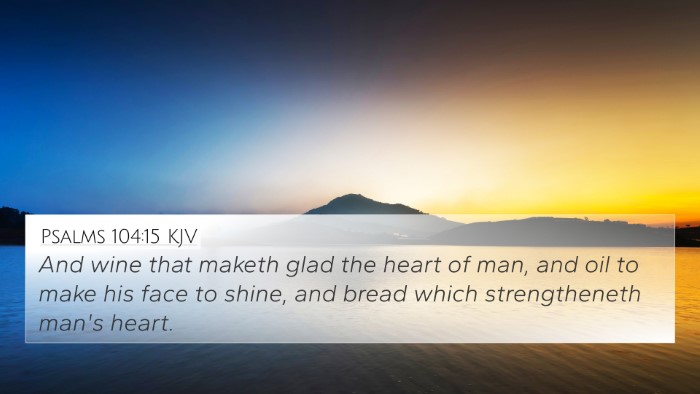
Psalms 104:15 (KJV) »
And wine that maketh glad the heart of man, and oil to make his face to shine, and bread which strengtheneth man's heart.

Matthew 26:28 (KJV) »
For this is my blood of the new testament, which is shed for many for the remission of sins.

Philippians 4:6 (KJV) »
Be careful for nothing; but in every thing by prayer and supplication with thanksgiving let your requests be made known unto God.

Ecclesiastes 10:19 (KJV) »
A feast is made for laughter, and wine maketh merry: but money answereth all things.
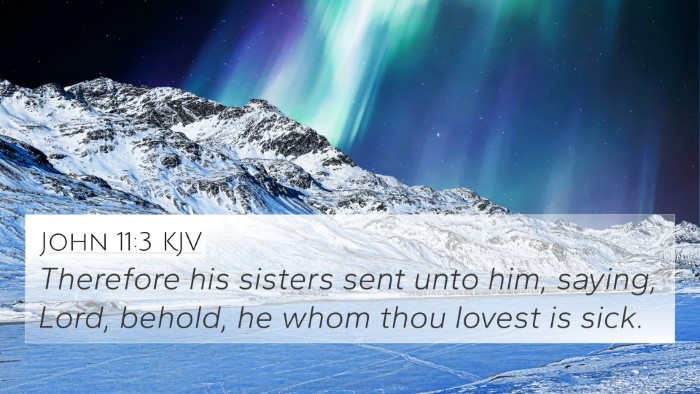
John 11:3 (KJV) »
Therefore his sisters sent unto him, saying, Lord, behold, he whom thou lovest is sick.

Isaiah 24:11 (KJV) »
There is a crying for wine in the streets; all joy is darkened, the mirth of the land is gone.
John 2:3 Verse Analysis and Similar Verses
Understanding John 2:3
Bible Verse: John 2:3 - "And when they ran out of wine, the mother of Jesus said to Him, 'They have no wine.'
Contextual Analysis
The Gospel of John, often referred to as the "spiritual Gospel," sets forth the ministry of Jesus with a focus on His divine nature and the miraculous signs that He performed. This verse introduces the first miracle of Jesus, which is significant for several reasons.
Meaning of John 2:3
-
Christ's First Miracle:
This verse leads into the account of Jesus turning water into wine at the wedding in Cana, illustrating His divine authority over nature and His compassion for human needs.
-
Mary's Role:
Mary's concern for the hosts at the wedding demonstrates her awareness of social customs and her deep maternal instinct to help those in need. Her intercession for the hosts indicates her position as an advocate. It shows her faith in Jesus' ability to respond to the situation.
-
Symbolism of Wine:
In biblical times, wine represented joy and celebration. The absence of wine signifies a lack of joy and an impending embarrassment for the hosts, marking the importance of this miracle in restoring happiness.
Commentaries Insights
Insights drawn from various public domain commentaries provide a deeper understanding of this passage:
-
Matthew Henry:
Henry highlights the miraculous nature of Jesus' actions, emphasizing how His willingness to perform miracles demonstrates His compassion. He also notes the symbolic implications of Jesus ushering in a new era of joy through His first miracle.
-
Albert Barnes:
Barnes points out the significance of Mary’s statement as a call for action. He stresses how this moment not only serves as a catalyst for Jesus' first miracle but also reflects the human need for divine help in our lives.
-
Adam Clarke:
Clarke offers a detailed examination of the cultural context of weddings in Jewish tradition. He elaborates on the potential disgrace of the hosts for running out of wine, underlining the urgency of the situation.
Cross References
This verse connects with various other passages that illuminate its themes:
- Isaiah 25:6: "On this mountain, the Lord Almighty will prepare a feast of rich food for all peoples, a banquet of aged wine—the best of meats and the finest of wines." - This reflects the joy and abundance that wine symbolizes in scripture.
- Matthew 9:17: "Neither do people pour new wine into old wineskins." - Highlighting Jesus' role in bringing forth something new and joyous.
- John 15:11: "I have told you this so that my joy may be in you and that your joy may be complete." - Relating to the joy restored through Jesus.
- Romans 12:15: "Rejoice with those who rejoice; mourn with those who mourn." - Emphasizing communal joy and sorrow.
- Revelation 19:9: "Blessed are those who are invited to the wedding supper of the Lamb!" - Illustrating the joy associated with weddings, paralleling the wedding at Cana.
- Psalms 104:15: "Wine that gladdens human hearts, oil to make their faces shine, and bread that sustains their hearts." - Affirming the joy wine brings to life.
- Ephesians 5:18: "Do not get drunk on wine, which leads to debauchery. Instead, be filled with the Spirit." - A call to understand the true source of joy and celebration.
Thematic Connections
John 2:3 connects with multiple themes across the Bible. Exploring these connections unveils the richness of scriptural interrelationships:
-
The Joy of the Lord:
The joy signified by wine is a recurring theme in scripture, celebrating God's provision and blessings, resonating through verses like Psalms 126:2.
-
Divine Provision:
Just as Jesus provides wine, He also meets spiritual needs as depicted in Philippians 4:19 ("And my God will meet all your needs according to the riches of his glory in Christ Jesus.").
-
Transformation:
The turning of water into wine symbolizes transformation found in Christ (e.g., 2 Corinthians 5:17 - "Therefore, if anyone is in Christ, the new creation has come: The old has gone, the new is here!").
-
Faith and Intercession:
Mary's faith is reflected in other passages where intercession is highlighted (e.g., James 5:16 - "The prayer of a righteous person is powerful and effective.").
-
Celebration of Community:
The communal aspect of joy in sharing wine echoes throughout scripture, reinforcing fellowship as seen in Acts 2:46 ("They broke bread in their homes and ate together with glad and sincere hearts").
Exploring Themes through Cross-References
Using tools for Bible cross-referencing can deepen your understanding of John's narrative, as inter-biblical dialogue reveals the links between various scriptures.
This verse serves as an intersection of vital theological themes—joy, community, divine intervention, and the ushering in of a new covenant. Each element signifies the importance of understanding how these divine truths are woven throughout scripture, culminating in an understanding of who Jesus is and what He offers.
Conclusion
In summary, John 2:3 serves as a remarkable culmination of themes within the Bible—joy, provision, faith, and transformation. Each commentary and cross-reference enriches the comprehension of this pivotal event in Jesus' ministry, encouraging deeper exploration and reflection among Bible study participants.
